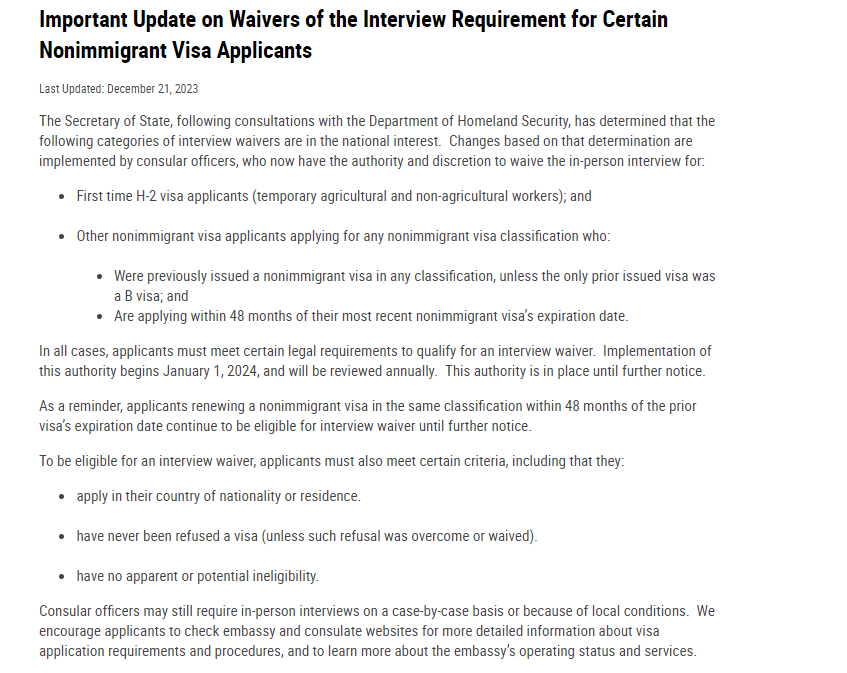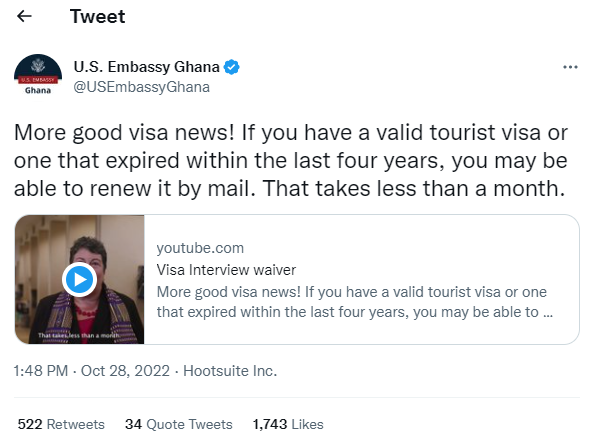The U.S Department of State announced major changes to the Visa interview waiver policy in 2024. If you plan to study or work in the U.S or just visit, you need to hear this.
In this guide, you will learn what the announcement means and how it may affect you. This informative guide simplifies the recent changes to the 2024 Visa Interview Waiver Program, a crucial update for those looking to study, work, or reside in the USA.
This guide breaks down the new eligibility criteria, the application process, and what these changes mean for applicants. Whether renewing your visa or applying for the first time under this program, this comprehensive guide simplifies the process, ensuring you’re fully informed and prepared.
USA Visa Interview Waiver Policy Updates for 2024
After consulting the Department of Homeland Security, the Secretary of State has determined that select categories of interview waivers are in the national interest. The policy applies to U.S non-immigrant visas.
These are visas issued to temporary visitors to the USA. The most common non-immigrant visas are:
- B1 and V2 visas for business, visitors, and tourists,
- F and M visas for students, and
- H visas for various workers.
There are many non-immigrant categories, but it won’t be listed to keep this guide short. Remember, the policy applies to all non-immigrant categories, unless noted.
Let’s review the rules quickly and break them down for different visa categories.
The changes are implemented by the consular officers, who now have the authority and discretion to waive the in-person interview. This means that the visa officers are deciding whether to waive your visa interview based on the guidelines we’re about to review.
However, the key takeaway is that they can still request an applicant who meets the visa waiver category to come in for an in-person interview.
- Criteria 1: Apply in your country of nationality or residence.
This means you’re applying in your country of citizenship or where you currently reside. For example, someone could be a citizen of India but work and live in Frankfurt, Germany. They can apply in India or Germany to qualify.
- Criteria 2: You’ve never been refused a visa unless such refusal was overcome or waived.
This means you’ve never been refused a visa or were initially rejected, but then approved later. For example, someone may have been denied on their first attempt, but have got their visa on their second attempt.
- Criteria 3: You have no apparent or potential eligibility.
This sounds vague, but what it really means is you don’t fall into select categories for which the U.S government doesn’t issue visas. These include individuals who may have criminal charges and may be a security risk or have violated immigration policies previously amongst others. This doesn’t apply to most cases.
On top of these three criteria, there are additional ones. Let’s review those in detail.
Remaining Criteria
- H-2 visa applicants.
You’re eligible for a visa waiver as long as you meet the first three criteria. For all other non-immigrant visa applicants, you must meet two additional criteria. They are:
You must have any U.S non-immigrant visa except a B visa. For example, you’ll qualify if you’re applying for an H-1B and have an F visa.
On the other hand, if you just have a B visa, you won’t qualify. For example, if you’re applying for an F1 visa and have a previous B1/B2 visa, you won’t be eligible for the interview waiver.
There is one slight nuance to it. Your last non-immigrant visa should be current or have expired no more than four years ago. This can get confusing, let’s take a look at three scenarios:
- If your last non-immigrant visa is active or has expired in 2021 or later, great news, you qualify.
- If your last non-immigrant visa has expired in 2019 or before, you don’t qualify.
- If your last non-immigrant visa expired in 2020, your expiration date should be after your potential visa appointment date.
For example, if your potential visa appointment date is on July first, 2024, your previous visa should not have expired before July first, 2020.
This cut-off date can get tricky, so if you fall into this category, you should put in your application immediately to improve your chances of qualifying for the interview waiver.
Also, it’s important to remember that the visa officers can still require you to come in. Finally, the US government can change this policy at any time. It’s likely to stick through the end of 2024.
That wraps up about the updates on the U.S visa interview waiver policy changes for 2024.
Some frequently asked questions about Visa Interview Waiver Policy Updates for 2024 and answers.
Question: Do you know if L1B (blanket petition) is also eligible for visa interview waiver in 2024?
Answer: It is a non-immigrant visa, so as long as applicants meet the criteria, they should qualify for an interview waiver.
Question: Is 352 days ban news true for refused f1 candidates?
Answer: This news is not official, check official website.
Disclaimer: This site is not owned by any U.S Government Agency or an Immigration attorney. The contents in the site is for informational purpose only, collected from various public domains. You may need to contact an Immigration Attorney for your specific immigration needs.
I hope this guide has been helpful to you. Thanks.
 Jobsscholar Jobs Search | Education Hub | Scholars Portal
Jobsscholar Jobs Search | Education Hub | Scholars Portal

